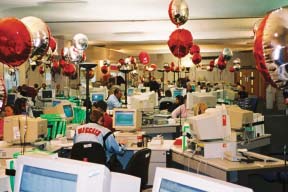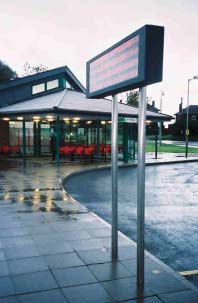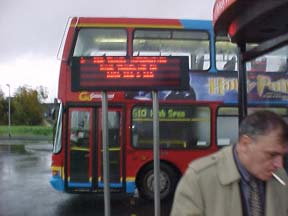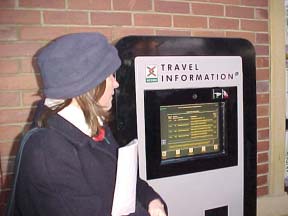U.S. Department of Transportation
Federal Highway Administration
1200 New Jersey Avenue, SE
Washington, DC 20590
202-366-4000
The technical part of the visit to Newcastle included:
GNER is one of the 25 private train companies operating passenger services in Great Britain under franchise to the Strategic Rail Authority. It runs between London, Leeds, York, Newcastle, Edinburgh, and Aberdeen. This center is the GNER phone center for the purchase of railway passes and trip planning information throughout Great Britain. Two call center managers oversee more than 200 employees. The center sells tickets for all 25 railroad companies serving Great Britain. Times of operations are from 7:00 AM until 10:00 PM daily. The railroad ridership has shown growth of 15 to 20 percent this year. The GNER receives a 9 percent commission on ticket sales. Eighty percent of all calls are answered within 20 seconds, and the center experiences a 5 percent abandon rate. There are 20 phone lines available. Employee training consists of 3 weeks of classroom training and 1 week of actual on-the-job training followed by another 3 weeks in the classroom. Sales representatives must be familiar with 80 different rail fares. The call center is independent from the rail operations.
NRES is a rail timetable and fares enquiry service provided jointly by the passenger train companies. The NRES call center answers up to 200,000 calls daily, provided under contract to specialist call center operators. The Newcastle location, which is owned and managed by British Telecom, has two major call centers and two smaller ones. More than 500 staff are employed at the Newcastle location and 1,700 are employed nationwide. The center operates 16 hours per day, 365 days per year. The Newcastle location won the latest "mystery shopper" competition and scored 98 percent. This score indicates an emphasis on high customer service and high-quality service. Employees receive a 3-week training course. Railroad timetable information is available electronically. Printed timetables are available in case of computer system failure. All railway fares are available. Ticket purchase requests are transferred to individual train operator call centers such as the GNER center.
 Figure 55. NRES call center, Newcastle.
Figure 55. NRES call center, Newcastle.
Cell phone calls account for 50 percent of the total calls received. Most cell phone inquiries are received during the evening and weekends (off-peak cell phone period). Special events create an increase in the demand for real-time information from 5 to 50 percent of the calls. The center has 200 phone lines available, and 140 are in service at any time. There are no automated answering systems, because person-to-person service is preferred. The current operation answers 93 percent of all calls with a 14-second wait time.
Information content has evolved from what was required by contract to what is required by the customers. The center uses mystery shoppers to evaluate service quality. Operators have a catalog of answers available on-line for frequently asked questions. All other information is also available on the Internet. NRES is in the process of procuring a real-time information system. It has been estimated that, on average, each inquiry generates 2.45 pounds in revenue for train operators. The NRES is paid 0.55 pound per call by rail operators. The contract for the operation of the center has incentives and penalties. The center notifies the media concerning train service interruptions within 10 minutes of incidents taking place and also notifies the media when normal service returns.
The Travel Shop is a retail ticket outlet that also provides information for bus and rail services. It generates revenue by commission on ticket sales and gets 4 percent of its sales from rail, 5 percent from Metro and bus, and 10 percent on holiday travel tours. The Travel Shop also provides journey-planning information.
The Ryton rural bus interchange was built because 40 percent of households in Western Gateshead are without a car, which resulted in long journey times to main centers of Newcastle. The existing system had confusing bus service patterns and there was generally a lack of public transport in the rural areas.
The solution was to build an interchange center that provides access to the trunk bus lines. It is a staffed facility providing a safe and secure waiting facility 24 hours per day, and also uses CCTV. It offers real-time traveler information and a flexible bus and minibus service serving the Ryton interchange from rural areas. Through ticketing is provided for all trips even if the passengers use different bus companies. Subsidies for taxis are available if a passenger is stranded. The project was funded through a grant from the national government. The system also encourages the use of bicycles by providing storage lockers. The bus service runs from 5:30 AM until midnight.
 Figure 56. Ryton rural interchange, Newcastle.
Figure 56. Ryton rural interchange, Newcastle.
Transpod is an electronic passenger information kiosk that provides journey planning on a regional basis. It has next departure, timetable, general public transport information, and direct links to taxi companies.
 Figure 57. Ryton rural interchange, Newcastle.
Figure 57. Ryton rural interchange, Newcastle.
Traveline North East is a regional call center providing information on all forms of public transport (bus, rail, ferry, and national rail). It is one of 29 offices in Britain and has been in operation for 2 years. This center receives approximately 600,000 calls annually and operates from 7:00 AM to 8:00 PM daily. It provides multimodal journey planning from point to point. Traveline North East is funded by contract to 33 private transit operators in the region. All data are provided by the transit operators. The average length of an information call is 1.5 minutes. Operators also provide trip cost information although they are not required to do so. Most trips are planned via local bus. The standard is that 90 percent of the calls are answered within 30 seconds. The center has 20 phone lines, and 15 lines are in use at any time. There is no scripted or electronic answering, and personal service is preferred. Costs are allocated to the shareholders on the basis of system miles. Complaint calls or lost and found inquiries are passed on to the appropriate private operator. All the information is available on the Traveline website (see section below on London).
 Figure 58. Transpod, Newcastle.
Figure 58. Transpod, Newcastle.
| << Previous | Contents | Next >> |